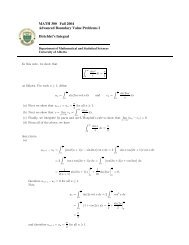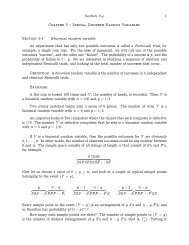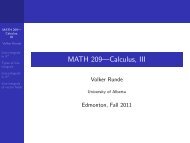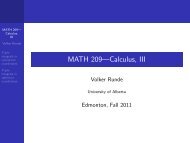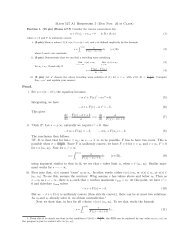Math 411: Honours Complex Variables - University of Alberta
Math 411: Honours Complex Variables - University of Alberta
Math 411: Honours Complex Variables - University of Alberta
Create successful ePaper yourself
Turn your PDF publications into a flip-book with our unique Google optimized e-Paper software.
40 CHAPTER 5. CAUCHY’S INTEGRAL THEOREM AND FORMULA<br />
(iv) for each z0 ∈ D, there exists r > 0 with Br[z0] ⊂ D and<br />
f(z) = 1<br />
�<br />
f(ζ)<br />
2πi ζ −z dζ<br />
for z ∈ Br(z0);<br />
∂Br(z0)<br />
(v) f is infinitely <strong>of</strong>ten complex differentiable on D;<br />
(vi) for each z0 ∈ D, there exists a neighbourhood U ⊂ D <strong>of</strong> z0 such that f has an<br />
antiderivative on U.<br />
Pro<strong>of</strong>. (i) =⇒ (ii) is Goursat’s Lemma.<br />
(i) =⇒ (iii) is the Cauchy Integral Formula for circles, and (iii) =⇒ (iv) is trivial.<br />
(iv) =⇒(v) followsimmediately fromTheorem 5.4, and(v) =⇒ (i) isagaintrivial.<br />
(ii) =⇒ (vi) follows from Theorem 5.2 because every z0 ∈ D has an open, starshaped<br />
neighbourhood contained in D.<br />
(vi) =⇒ (v): Let z0 ∈ D, and let U ⊂ D be a neighbourhood <strong>of</strong> z0 such that f<br />
has an antiderivative, say F, on U. Then F is holomorphic on U. Applying (i) =⇒<br />
(v) to F, we see that F is infinitely <strong>of</strong>ten complex differentiable on U. Consequently,<br />
f = F ′ is infinitely complex differentiable on U. Since z0 ∈ D was arbitrary, we<br />
conclude that f is infinitely <strong>of</strong>ten complex differentiable on D.<br />
We conclude this chapter with Liouville’s Theorem and its application to the<br />
Fundamental Theorem <strong>of</strong> Algebra.<br />
Definition. A holomorphic function defined on all <strong>of</strong> C is called entire.<br />
Theorem 5.6 (Liouville’s Theorem). Let f : C → C be a bounded entire function.<br />
Then f is constant.<br />
Pro<strong>of</strong>. We will show that f ′ ≡ 0.<br />
Let C ≥ 0 be such that |f(z)|≤ C for all z ∈ C. Let z ∈ C be arbitrary, and let<br />
r > 0. By the generalized Cauchy integral formula, we have<br />
|f ′ (z)|= 1<br />
2π<br />
��<br />
�<br />
�<br />
�<br />
∂Br(z)<br />
f(ζ)<br />
(ζ −z)<br />
2 dζ<br />
�<br />
�<br />
�<br />
�<br />
1<br />
≤<br />
2π ℓ(∂Br(z))<br />
|f(ζ)| 1<br />
sup ≤<br />
ζ∈∂Br(z) |ζ −z| 2 2π 2πrC<br />
C<br />
=<br />
r2 r .<br />
Letting r → ∞, we obtain f ′ (z) = 0. This completes the pro<strong>of</strong>.<br />
Corollary 5.6.1 (Fundamental Theorem <strong>of</strong> Algebra). Let p be a non-constant polynomial<br />
with complex coefficients. Then p has a zero.<br />
Pro<strong>of</strong>. Assume that p has no zero. Then the function<br />
f: C → C, z ↦→ 1<br />
p(z)



